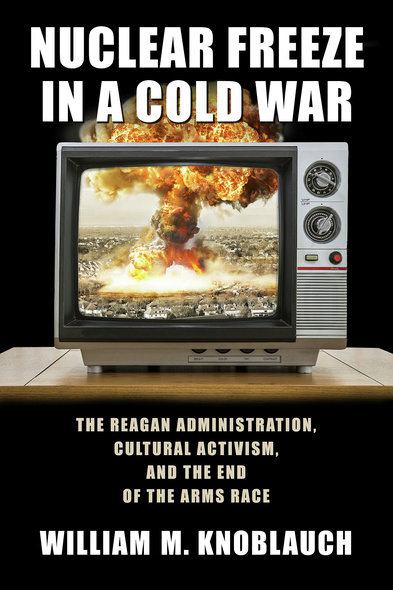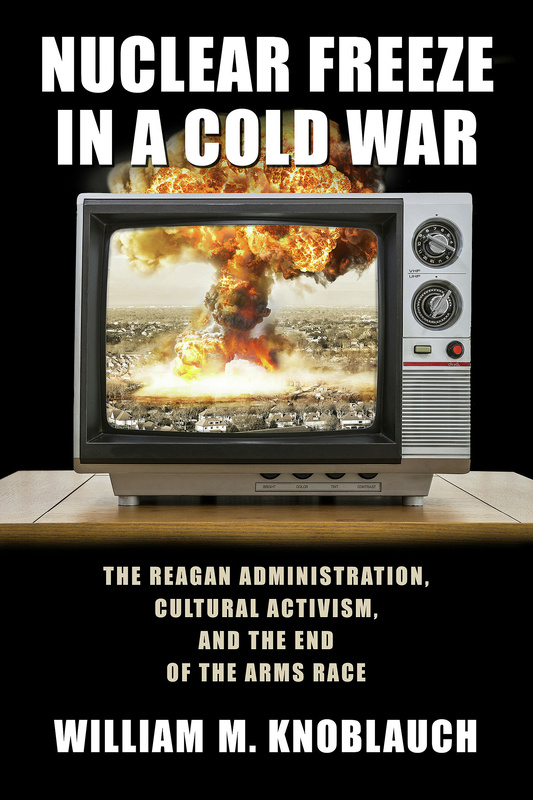Nuclear Freeze in a Cold War
The Reagan Administration, Cultural Activism, and the End of the Arms Race
University of Massachusetts Press
The early 1980s were a tense time. The nuclear arms race was escalating, Reagan administration officials bragged about winning a nuclear war, and superpower diplomatic relations were at a new low. Nuclear war was a real possibility and antinuclear activism surged. By 1982 the Nuclear Freeze campaign had become the largest peace movement in American history. In support, celebrities, authors, publishers, and filmmakers saturated popular culture with critiques of Reagan's arms buildup, which threatened to turn public opinion against the president.
Alarmed, the Reagan administration worked to co-opt the rhetoric of the nuclear freeze and contain antinuclear activism. Recently declassified White House memoranda reveal a concerted campaign to defeat activists' efforts. In this book, William M. Knoblauch examines these new sources, as well as the influence of notable personalities like Carl Sagan and popular culture such as the film The Day After, to demonstrate how cultural activism ultimately influenced the administration's shift in rhetoric and, in time, its stance on the arms race.
Alarmed, the Reagan administration worked to co-opt the rhetoric of the nuclear freeze and contain antinuclear activism. Recently declassified White House memoranda reveal a concerted campaign to defeat activists' efforts. In this book, William M. Knoblauch examines these new sources, as well as the influence of notable personalities like Carl Sagan and popular culture such as the film The Day After, to demonstrate how cultural activism ultimately influenced the administration's shift in rhetoric and, in time, its stance on the arms race.
This is a well-written book and the author has mined some very good primary sources. It's way past time for someone to engage the significance of Reagan-era antinuclear cultural activism.'—Edward Linenthal, author of Symbolic Defense: The Cultural Significance of the Strategic Defense Initiative and The Unfinished Bombing: Oklahoma City in American Memory
'The Cold War's fast pivot from escalation to resolution in the 1980s remains one of its mysteries. In an original analysis, William Knoblauch shows how antinuclear activists pushed the Reagan administration to adopt deescalatory rhetoric and policies, with transformative consequences. Smart and compelling, this book offers novel insight into the battle of ideas that unmade the Cold War order in the 1980s.'—Daniel J. Sargent, author of A Superpower Transformed: The Remaking of American Foreign Relations in the 1970s
'Bill Knoblauch's excellent work takes the full measure of the antinuclear culture of the 1980s, from The Fate of the Earth to The Day After and beyond. It also, for the first time, gives the full story of the major effort to blunt and contain the impact of that opposition culture by a Reagan administration that was really tuned in to mass communications techniques. This is a sobering and freshly detailed book that students of the 1980s and of propaganda wars should read.'—Doug Rossinow, author of The Reagan Era: A History of the 1980s
'A very timely study of why 'popular culture matters' to presidential administrations and policy debates.'—H-Net Reviews
'In this breezy, accessible book, William M. Knoblauch takes us back to the early 1980s, when fears of nuclear war that had lain dormant for two decades returned with a vengeance . . . Nuclear Freeze in a Cold War is a nice introduction to a moment that, sadly, has become newly relevant.'—Journal of American History
William M. Knoblauch is assistant professor of history at Finlandia University.





